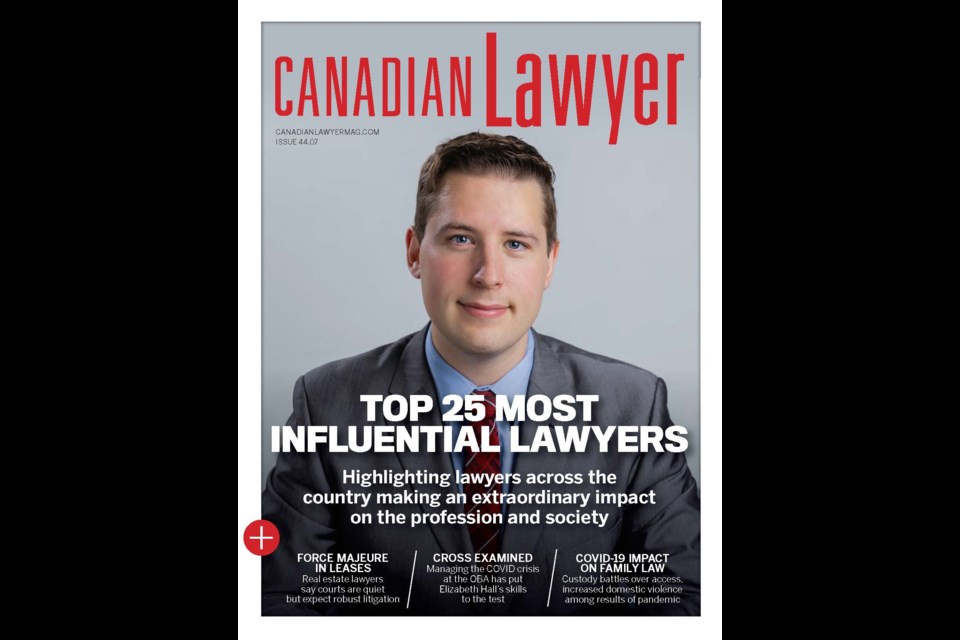Lawyer Talon Regent is the only Saskatchewan jurist named one of the top 25 legal professionals in Canada and one of the top five young influencers in the country.
Canadian Lawyer magazine recently released its 11th annual list of the most influential lawyers who have made significant efforts during the last 18 months. Several hundred nominations were submitted, and from there, the editorial panel shortlisted 174 candidates and tallied 19,115 votes from readers. The panel then compiled the list.
“Inclusion in the Top 25 speaks to a level of respect, the ability to influence public opinion and to help shape the laws of this country and others; contribution to the strength and quality of legal services; involvement and impact within the justice community; and social and political influence and involvement,” the article explained.
A lawyer for four years, Regent, 29, is known for his aptitude with legal technology, the article continued. The pandemic forced the law profession to adapt to physical distancing and conduct and deliver operations remotely; Regent assisted in making this transition smother for many firms and companies.
He is also working on a virtual reality trial simulator to help lawyers, law students, and self-represented litigants practise their trial advocacy skills, offering them real-time feedback in a consequence-free environment.
Excited to be nominated
“I am incredibly excited to be listed as one of Canada’s top five influencer lawyers,” Regent told the Moose Jaw Express. “Canadian Lawyer is one of the more reputable law magazine, so knowing they’re recognizing the contributions I’ve made and the difference that my work has created in society — that’s a major compliment.”
Each lawyer received a personalized magazine cover with his or her face on the front; the actual cover has a simple graphic. With a chuckle, Regent said he asked for a couple of extra personalized copies for his parents, in-laws, friends, and his office.
“I didn’t think I had a snowball’s chance of being successful. I’ve no idea how many people voted for me, but I feel like it couldn’t have been more than 50,” he said. “So, I must have had some qualities that the vetting staff really liked and really wanted to share.”
Making the list has reminded Regent that his work is appreciated, he explained. He sometimes becomes caught up in the daily grind and doesn’t recognize the value he contributes. However, he feels good when he reviews how his practice has changed, how he has helped change the lives of his clients, and the positive effect he has had.
Technological innovations
According to the article, Regent has been recognized for supporting more technology and his efforts to bring the law practice into the 21st century. He also speaks to law students in high school and college about the latest technological legal tools available.
“Lawyers are notorious for not investing in technology. I don’t feel I’ve done anything particularly noteworthy, except for a push for people to adopt technology that other industries have already been using for decades,” he said.
It’s usually older lawyers who are resistant to technology since they run firms and make decisions, have been around for decades and who are comfortable with the status quo, continued Regent. Unless they can see a guaranteed return on investment, they aren’t interested in making changes.
Instead, Regent has been more successful in convincing younger lawyers to use technology regularly, including simple changes such as harnessing form fields, auto-populate and mail merge in Microsoft Office to save time.
Changes to the profession
Due to the pandemic, courthouses allowed more appearances and hearings by telephone and video. Lawyers were also able to witness the signing of documents by videoconference — they previously had to be in the same place as clients, a practice dating back 1,000 years — which had a big effect on Regent’s practice. Some of his clients, who are farmers, didn’t have to drive hours into town to sign a form.
“For me, it’s made the job a whole lot easier (to witness remotely). That being said, I was already tech-savvy, and I already understood the potential that this technology had for the practice of law … ,” he said. “And I predicted that these changes would come about. It was just a matter of flipping a switch on my systems.”
Virtual simulator
Regent has been working on the virtual reality trial simulator for three years since he is passionate about it, he enjoys playing video games and practising law, and is focused on justice issues. He believes the game — still in development — can help self-represented litigants and other legal professionals rehearse beforehand, especially if they are not strong public speakers.
He has programmed the game while he is speaking with a video game company to create life-like characters and realistic furniture. He doesn’t want to release a beta version since he would be liable — sued or disbarred — for giving false information in-game. Before unveiling it, his biggest goal is to produce the game within a reasonable budget and have the Law Society of Saskatchewan approve it.
“While I’m willing to take a bit of a hit financially just because I am so passionate about this,” Regent added, “I need to make sure it’s not going to cause me to miss any payments on my household bills or anything like that.”




